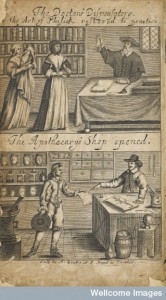 William Drage was born in Northamptonshire on the 8th January 1636. He had a grammar-school education and was apprenticed to an apothecary. In 1658 he opened his own apothecary shop in Hitchin (Hertfordshire) and established himself as a physician. He had an extensive practice that included the local gentry.1
William Drage was born in Northamptonshire on the 8th January 1636. He had a grammar-school education and was apprenticed to an apothecary. In 1658 he opened his own apothecary shop in Hitchin (Hertfordshire) and established himself as a physician. He had an extensive practice that included the local gentry.1
The closure of the Star Chamber in 1641 removed the government’s ability to conduct censorship trials and allowed the trade in vernacular (English language) books to flourish.2 Medical texts became a particularly popular genre. This was fostered by the influence of radicals who railed against the elitism they perceived in the Latin treatises produced by university educated physicians and especially those who belonged to the Royal College of Physicians.3 Between 1649 and 1699 282 books were registered with the stationers company that addressed themes of medicine, chemistry an astrology.4
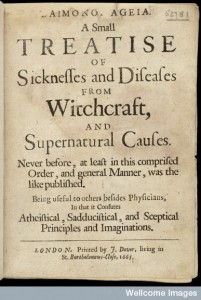 William Drage was a part of this trend compiling several books on specific diseases from continental works. These were eventually incorporated into his major text A Physical Nosonomy published in 1664. He also published a treatise on disease caused by witchcraft and possession in 1665 called Daimonomagia.5 Today’s blog however looks at a work published in the year of Drage’s death 1669: Physical Experiments: Being a Plain Description of the Causes, Signes, and Cures of most Diseases incident to the Body of Man.
William Drage was a part of this trend compiling several books on specific diseases from continental works. These were eventually incorporated into his major text A Physical Nosonomy published in 1664. He also published a treatise on disease caused by witchcraft and possession in 1665 called Daimonomagia.5 Today’s blog however looks at a work published in the year of Drage’s death 1669: Physical Experiments: Being a Plain Description of the Causes, Signes, and Cures of most Diseases incident to the Body of Man.
Drage started this treatise by censuring previous works and angrily decrying the effects that works called ‘practices of physick’ had on the state of medical learning. Drage’s upset at the works of his predecessors, interestingly, illuminates the ways in which medical learning was changing across the early modern period and emphasises the importance medical writers placed on establishing the authority of their knowledge. We perhaps take it for granted that our medical professionals and doctors are well-trained and knowledgeable; early modern medical men had to prove this learning and authority both through their practice and in the works they published.
So who was Drage frustrated with and why exactly?![V0005033 Lazare Rivière [Riverius]. Line engraving by C. Brunand.](https://earlymodernmedicine.com/wp-content/uploads/2013/08/7cdb6ebc9ebdc8c42e5205d38d21-199x300.jpg)
One of those Drage disparaged was Lazarus Riverius, a professor of medicine at the University of Montpellier from 1622 until his death in 1655. His treatise The Practice of Physick was translated by Nicholas Culpeper and published in English in 1655. Riverius and Drage were evidently on different sides of an argument about the best way to explain the treatment of diseases.
Riverius also argued that treatises before his own were not best for learning medicine. He said that they confused students of physick by presenting them with too many possible cures for each disease:
‘the almost infinite Company & variety of Medicaments, wherewith the Books of those that have delivered the Practical part of Physick do swarm; with which Young Beginners are so confounded, that they remain amazed, not knowing which to choose. I conceived it would be most profitable for them, if out of such a multitude of Medicaments, I should select the most choice, and which were most frequently used, and dispose them into the same order which we are wont to observe in our Practice, when we attend the Cure of our sick Patients.’6
So he created his own book to allow readers to understand ‘the Nature, Differences, Causes, Diagnostick, and Prognostick Signs, together with the Cure of all Diseases.’ 7
Riverius thus claimed authority for his book by suggesting that it offered a clear and comprehensive method of study for those who wanted to learn medicine. One that was not confused by the incorporation of a plethora of treatments for each disease.
Drage took an opposing stance. He believed that works such as Riverius’s falsely convinced students that there was an easy way to identify and treat each disease. He argued that those who followed, without question, the doctrines set out in such books would be misled into thinking that the drugs they described were infallible. He moaned that,
‘the young Practitioner reads them, he doth presently conceive he must, as these write, cure all such Diseases by such Medicines or Methods; but he shall be deceived: yet often such Cures have been; but Authors have deceived, by not telling how oft such a Medicine hath failed, as well as how oft it hath cured: for there is no Medicine in use, but hath cured some, and there is no[ne] so excellent as to cure all’.8
Drage repeatedly argued that the claims these authors made about the predictable nature of disease were incorrect and highly misleading, saying ‘Nature is not bound up to such Rules’ and ‘Nature not running in that Method as the Ancients, and also the Moderns, dancing after their Pipes, have imagined’.9
Drage thus wanted medical treatises to be clearer about the ways in which disease could be different in different bodies and wanted medical practitioners and writers to be honest about the potential for their treatments to fail. But this approach might have undermined a physician’s authority – if diseases were so changeable and treatments failed how could you trust a physician to identify the right disease and cure you? Drage argued that medical authority should come from building up knowledge through dissection and first-hand observations.
He exhorted readers (imagined to be students of medicine) to ‘open the twenty next Patients that die under his hands, and he will see in all of them singular things, as to what the Ancients writ, and will also finde that Nature is not bound up to a Method, or such an Order as some will have’.10 He also noted that his own successful practice was based on his ‘having writ about 1400 Observations for my own private use hitherto’. This he claimed was the best way to teach medicine ‘let them read onely Observations, and Experiences, and Similitudes, and therefrom, with their own consideration, and comparing one thing with another, make general Rules and Tenents in Philosophy.’11
![V0004693 Felix Plater [Platter]. Line engraving, 1688.](https://earlymodernmedicine.com/wp-content/uploads/2013/08/2d06eebd5297a09ae2eaec350581-168x300.jpg) Now it would be unfair to paint Drage as someone who criticised everyone. He did praise some medical writers – those who conformed to his own ideas about medical learning and knowledge. In particular he praised Felix Platter a physician in Basel :‘I chiefly commend Felix Platerus in his Practice of Physick, who followed his own Experience and Observations, though his own Experience was insufficient to demonstrate the Truth, all the Truth, and nothing but the Truth, in all Diseases.’12
Now it would be unfair to paint Drage as someone who criticised everyone. He did praise some medical writers – those who conformed to his own ideas about medical learning and knowledge. In particular he praised Felix Platter a physician in Basel :‘I chiefly commend Felix Platerus in his Practice of Physick, who followed his own Experience and Observations, though his own Experience was insufficient to demonstrate the Truth, all the Truth, and nothing but the Truth, in all Diseases.’12
Drage’s preface to his medical treatise allows us to understand the various ways in which medical practitioners and writers claimed to have medical authority and the contention that existed in medical learning. Most medical men relied upon and venerated the ancient works of Galen, Hippocrates and Aristotle. However in the early modern period some started to question these doctrines and argue that more credence should be given to first-hand observation and experimentation. Finally both Drage and Riverius comments emphasise that learning about the body and how to treat a range of diseases was difficult and was not necessarily made easier by easy access to a range of medical literature. When so many different texts were saying that they contained the best knowledge, the best cures and the best way to understand disease, who was a young student to believe?
1. Oxford Dictionary of National Biography, www.oxforddnb.com, s.v. ‘William Drage’ by Bernard Capp.
2. Irma Taavitsainen, Peter Murray Jones, Paivi Pahta, Turo Hiltunen, Ville Marttila, Maura Rtia, Carla Suhr and Jukka Tyrkko, ‘Medical texts in 1500-1700 and the corpus of early modern English medical texts’, in Irma Taavitsainen and Paivi Pahta (eds), Medical writing in early modern English (Cambridge: Cambridge University Press, 2011), 9-25 at 13.
3. Laura Gowing, Common bodies: women, touch and power in seventeenth-century England (New Haven and London, 2003). 17.
4. Mary Rhinelander McCarl, ‘Publishing the works of nicholas culpeper, astrological herbalist and translator of Latin medical works in seventeenth-century London’, Canadian Bulletin of Medical History, 13, (1996), 225-76 at 230
5. Oxford Dictionary of National Biography, www.oxforddnb.com, s.v. ‘William Drage’ by Bernard Capp.
6. Lazarus Riverius, The Practice of Physick in seventeen several books … (London, 1655), 6.
7. Ibid, 7.
8. William Drage, Physical Experiments: Being a Plain Description of the Causes, Signes, and Cures of most Diseases incident to the Body of Man. To which is added a Discourse of Diseases proceeding from Witchcraft. (London, 1668), 4-5.
9. Ibid, 5-6.
10. Ibid, 8.
11. Ibid, 28, 46.
12. Ibid, 5.
© Jennifer Evans, all rights reserved.
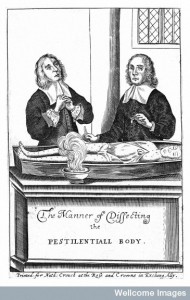
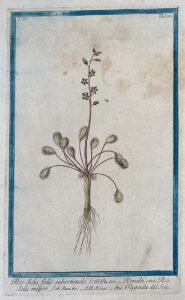
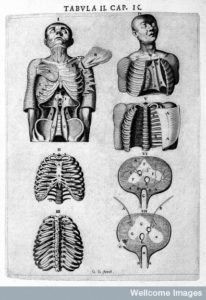

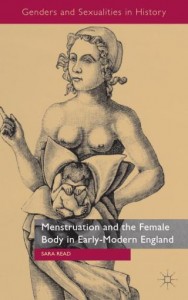
2 thoughts on “Nature follows no Rules”
Comments are closed.